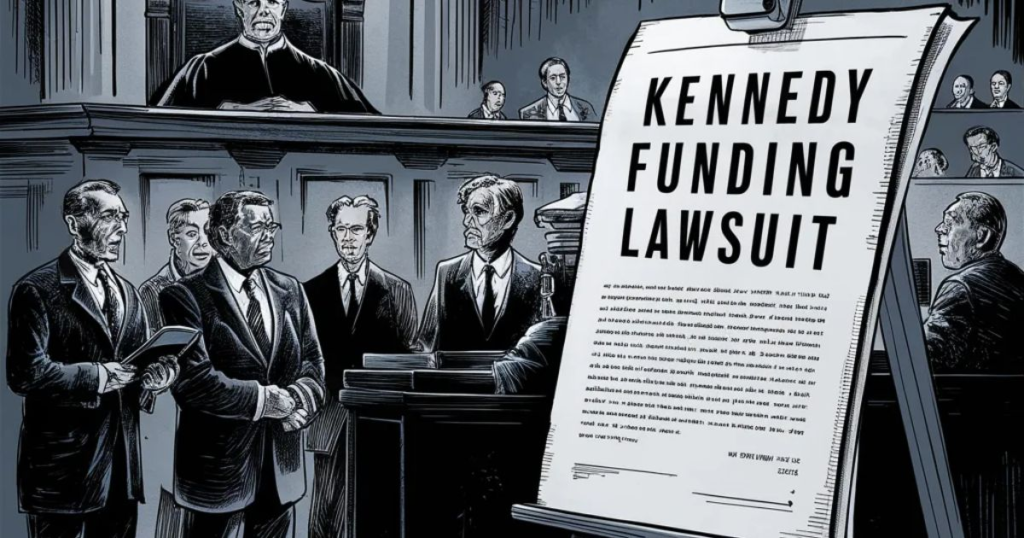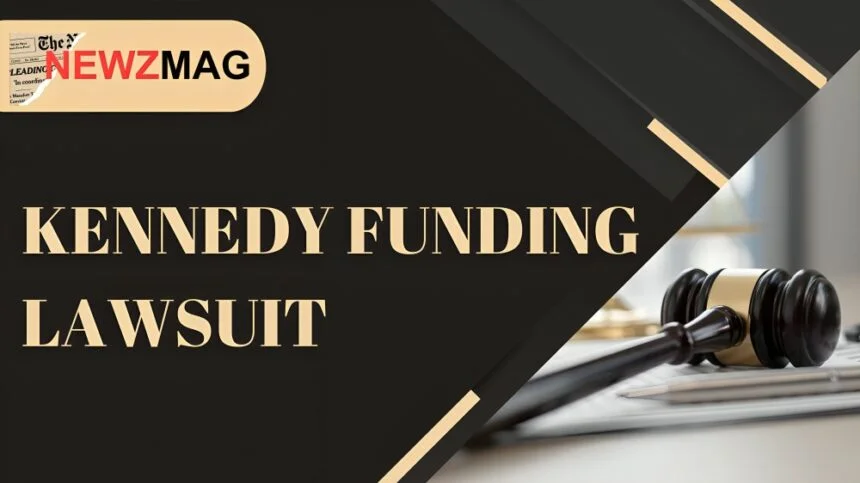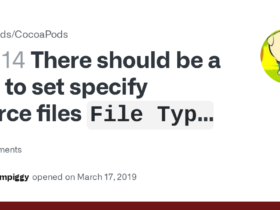The Kennedy Funding lawsuit revolves around a legal dispute involving a loan provided by Kennedy Funding, a private lender specializing in real estate and commercial loans. This lawsuit highlights the challenges that can arise when loan agreements go wrong, affecting both lenders and borrowers. In this article, we will explore the details of the lawsuit, the parties involved, and the broader implications for the lending industry.
What Is a Lawsuit?
A lawsuit is a legal action taken by one party against another in a court of law. It typically occurs when one party believes they have been wronged or when there is a breach of contract, resulting in damages or financial losses. Lawsuits allow individuals or companies to seek compensation, enforce agreements, or resolve disputes through a formal legal process.
Lawsuits often begin with a complaint, a legal document filed by the plaintiff (the party bringing the case) that outlines their grievances and the relief they are seeking. The defendant (the party being sued) then has the opportunity to respond to the complaint. From there, the case can proceed through several stages, including discovery, motions, trial, and possibly an appeal, if necessary.
Who Is Kennedy Funding?
Kennedy Funding is a prominent private lender based in the United States, specializing in hard-money loans, bridge loans, and commercial real estate financing. The company is well-known for providing short-term loans to borrowers who may not qualify for traditional bank financing. Their loan programs are often used by developers, investors, and businesses looking for quick access to capital.
Unlike conventional lenders, Kennedy Funding operates in a niche market, offering loans that are often secured by real estate. These loans typically come with higher interest rates and more flexible terms than traditional loans. As a result, Kennedy Funding has built a reputation for being able to fund deals quickly, making them a popular choice for those in need of immediate capital.
However, because these loans often carry higher risks, they can sometimes lead to disputes, particularly when borrowers face challenges repaying the loans or when there are misunderstandings about the terms of the loan agreement.
Why Did the Kennedy Funding Lawsuit Happen?
The Kennedy Funding lawsuit stemmed from a dispute between the lender and a borrower over the terms and conditions of a loan. The lawsuit involved allegations of breach of contract, misrepresentation, and other legal issues that are common in financial disputes. In many cases like this, the borrower may claim that the lender did not uphold their end of the agreement, while the lender argues that the borrower failed to meet their financial obligations.

In the case of Kennedy Funding, the borrower may have encountered difficulties in repaying the loan, leading to a legal battle over whether the loan terms were fair and whether Kennedy Funding acted in good faith. Disputes like this often arise when borrowers find themselves in financial distress, struggling to meet their payment obligations, or when there are disagreements over how the loan proceeds are to be used.
What Happens in Court?
In court, the parties involved in the Kennedy Funding lawsuit would present their respective arguments, supported by evidence and legal documentation. The plaintiff (the borrower) would need to demonstrate that Kennedy Funding breached the loan agreement or engaged in practices that harmed them financially. On the other hand, Kennedy Funding would present its case, showing that it acted within the boundaries of the agreement and that the borrower failed to fulfill their repayment obligations.
The court would examine all relevant documents, including the loan agreement, correspondence between the parties, and any financial records that support the claims made by either side. Witnesses, including financial experts or representatives from Kennedy Funding, might also testify to clarify the details of the loan transaction and the issues that led to the lawsuit.
What Does the Loan Agreement Say?
The loan agreement is the foundation of any financial transaction between a lender and a borrower. In the Kennedy Funding lawsuit, the loan agreement would have outlined the terms of the loan, including the interest rate, repayment schedule, collateral, and any conditions for default. It is essential for both parties to fully understand the terms of the loan agreement before signing it, as this document serves as the primary reference point in any legal dispute.
In this case, the loan agreement likely included clauses regarding what would happen if the borrower defaulted on the loan, such as the lender’s right to seize collateral or take legal action. The lawsuit would hinge on whether Kennedy Funding adhered to these terms and whether the borrower was aware of and agreed to them at the time of the loan.
What Are the Outcomes of a Lawsuit?
The outcome of a lawsuit can vary depending on the strength of the evidence presented, the legal arguments made, and the specific circumstances of the case. In the Kennedy Funding lawsuit, several possible outcomes could occur:
- The borrower wins: If the court finds that Kennedy Funding breached the loan agreement or acted unfairly, the borrower may be awarded damages or a reduction in the amount owed.
- Kennedy Funding wins: If the court determines that Kennedy Funding acted within its rights and that the borrower defaulted on the loan, the borrower may be ordered to repay the loan in full, including any penalties or interest.
- Settlement: Many lawsuits are resolved through settlements, where both parties agree to a compromise without proceeding to a full trial. This could involve adjusting the terms of the loan, reducing the amount owed, or reaching a payment plan.
What Did the Court Decide in the Kennedy Funding Lawsuit?
The court’s decision in the Kennedy Funding lawsuit would have been based on the legal arguments presented by both parties and the terms of the loan agreement. If the court found that Kennedy Funding violated the agreement or engaged in deceptive practices, it might have ruled in favor of the borrower. This could include awarding financial compensation or restructuring the loan.
Alternatively, if the court found that the borrower failed to meet their obligations under the loan agreement, Kennedy Funding may have won the case. This could result in the borrower being required to repay the full loan amount, including any additional penalties or legal fees.
What Happens After the Court Decision?
Once the court has rendered a decision, both parties must comply with the ruling. If the borrower wins, they may receive financial compensation or have the loan terms adjusted. In cases where Kennedy Funding wins, the borrower may be required to pay back the loan, possibly with additional penalties or interest.
After a court decision, it is also possible for either party to appeal the ruling if they believe that legal errors were made during the trial. An appeal would take the case to a higher court, which would review the proceedings and potentially overturn or modify the original decision.
Can Lawsuits Like This Happen Often?
Yes, lawsuits like the Kennedy Funding lawsuit can happen often in the lending industry. Financial disputes between lenders and borrowers are common, especially in situations involving hard-money loans or high-risk borrowers. When loan agreements are complex or when borrowers face unexpected financial challenges, disputes can arise over the terms of repayment, interest rates, or collateral.

In some cases, borrowers may feel that they were misled or that the loan terms were unfair, leading to legal action. On the other hand, lenders like Kennedy Funding may take legal action to recover funds from borrowers who default on their loans.
How Can You Avoid Loan Problems?
To avoid problems with loans, borrowers should take several steps:
- Carefully review loan agreements: Always read and understand the terms of the loan before signing. This includes interest rates, repayment schedules, and any penalties for default.
- Work with reputable lenders: Choose lenders with a track record of transparency and fairness. Avoid lenders with a history of lawsuits or complaints.
- Plan for repayment: Ensure that you have a solid financial plan for repaying the loan, including contingencies for unexpected expenses or downturns in income.
- Seek legal advice: If you are unsure about the terms of a loan, consult with a lawyer or financial advisor before signing any documents.
What Should Borrowers Do if They Can’t Pay?
If a borrower finds themselves unable to make loan payments, they should take immediate action:
- Communicate with the lender: Lenders may be willing to negotiate new terms or offer temporary relief if they are informed of the situation early on.
- Explore refinancing options: Refinancing the loan with another lender may help lower monthly payments or extend the repayment period.
- Seek legal advice: If negotiations with the lender fail, it may be necessary to consult a lawyer to understand your options and avoid legal action.
Conclusion: Understanding the Kennedy Funding Lawsuit
The Kennedy Funding lawsuit is a reminder of the importance of understanding loan agreements and the potential legal consequences of financial disputes. Whether you are a borrower or a lender, clear communication, careful planning, and a thorough review of loan terms are essential to avoid legal problems. This case highlights the complexities of the lending industry and the need for both parties to act in good faith throughout the loan process.
The Bottom Line
Lawsuits like the Kennedy Funding case underscore the importance of transparency and due diligence in loan transactions. Borrowers should always fully understand their obligations before entering into a loan agreement, and lenders must ensure that their practices are fair and legal. By taking these steps, both parties can minimize the risk of financial disputes and costly lawsuits.














Leave a Reply